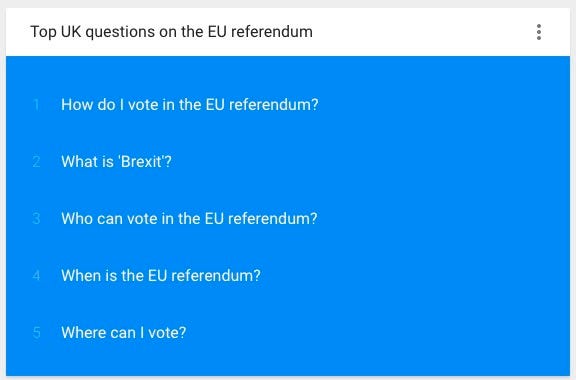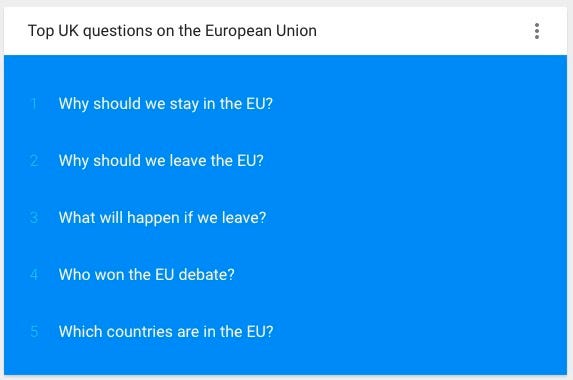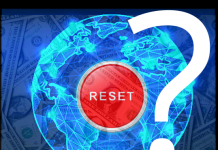 Washington Post says yes, they were. IBTimes says No, there weren’t. The issue is not really who is right and who is wrong; it is the fact that this has become an issue. It is not the fault of the Britons if some of them searched “what is E.U.” after they voted to get out of it. Yes, it may sound a little funny that they voted for such an important issue without gathering enough information and understanding the consequences but nonetheless, it is good to find out what it is. Better later than never, especially when you have to deal with it.
Washington Post says yes, they were. IBTimes says No, there weren’t. The issue is not really who is right and who is wrong; it is the fact that this has become an issue. It is not the fault of the Britons if some of them searched “what is E.U.” after they voted to get out of it. Yes, it may sound a little funny that they voted for such an important issue without gathering enough information and understanding the consequences but nonetheless, it is good to find out what it is. Better later than never, especially when you have to deal with it.
The British are frantically Googling what the E.U. is, hours after voting to leave it | Washington Post
The whole world is reeling after a milestone referendum in Britain to leave the European Union. And although leaders of the campaign to exit Europe are crowing over their victory, it seems many Britons may not even know what they had actually voted for.
Awakening to a stock market plunge and a precipitous decline in the value of the pound that Britain hasn’t seen in more than 30 years, voters now face a series of economic shocks that analysts say will only worsen before they improve. The consequences of the leave vote will be felt worldwide, even here in the United States, and some British voters say they now regret casting a ballot in favor of Brexit.
“Even though I voted to leave, this morning I woke up and I just — the reality did actually hit me,” one woman told the news channel ITV News. “If I’d had the opportunity to vote again, it would be to stay.”
That confusion over what Brexit might mean for the country’s economy appears to have been reflected across the United Kingdom on Thursday. Google reported sharp upticks in searches not only related to the ballot measure but also about basic questions concerning the implications of the vote. At about 1 a.m. Eastern time, about eight hours after the polls closed, Google reported that searches for “what happens if we leave the EU” had more than tripled.


The run-up to the vote was marked by a bitterly divided campaign, one that was as much about immigration fears as it was about the global economy. But despite the all-out attempts by either side to court voters, Britons were not only mystified by what would happen if they left the E.U. — many seemed not to even know what the European Union is. (Read full https://www.washingtonpost.com/news/…the-british-are-frantically-googling-what-the-eu-is-hours-after-voting-to-leave-it/)
No, Britons Were Not Frantically Googling ‘What Is The EU?’ Hours After Brexit Vote | IBTimes
According to Google, by the time the news was coming through Friday morning that the ‘leave’ campaign had been victorious, there had been a 250 percent rise in the number of searches for “What happens if we leave the EU?” while “What is the EU?” was the second-most-popular question being asked in relation to the Brexit in the hours since the decision to leave the EU had been announced.
The problem with using Google Trends as an indication of anything other than a relative increase or decrease over previous norms is that it doesn’t give the whole picture. Yes, there may have been a big spike in searches about what happens if the U.K. leaves the EU, but compared with what? Were there hundreds of thousands of people searching Google for these answers? Millions?
It turns out the figure is likely to be less than 1,000 people, or 0.001 percent of the population. (Read full http://www.ibtimes.com/no-britons-were-not-frantically-googling-what-eu-hours-after-brexit-vote-2387205)





































